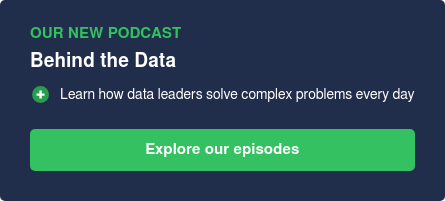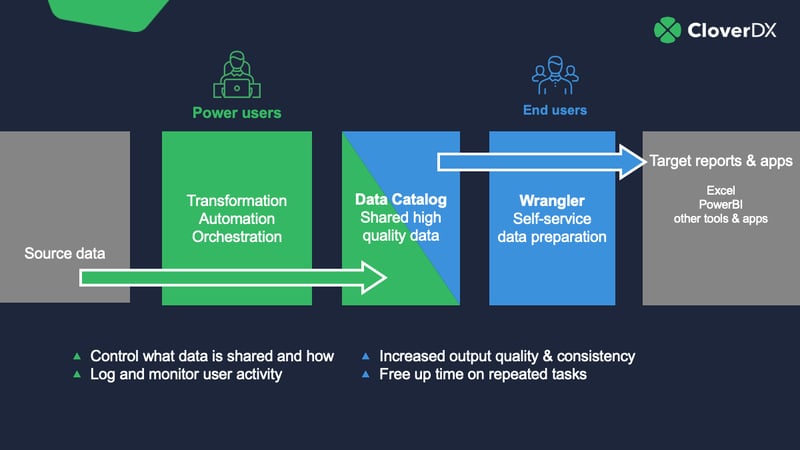Year-on-year, you strive for the best possible business outcomes — profit increases, consistent customer satisfaction, and a larger market share. Sometimes you’ll hit these targets. Other times, your actual outcomes might not be as fantastic as you’d hoped for.
It’s not unreasonable to aim for greatness. But to achieve this greatness, you must have a complete, consistent view of your business. Only then can you identify trends, opportunities, and risks, and make the best business decisions to improve your outcomes.
In other words, you need data. And you need this data to be comprehensive, accessible, and truthful. This means breaking down siloed pockets of information, bringing your technical and business teams together, and assembling your insights.
This requires data collaboration.
What is data collaboration?
Simply put, data collaboration refers to the process of gathering data from a broad range of sources, departments, and systems. This is often supported by a centralized data integration tool.
The aim of data collaboration is to:
- Break down data silos and increase visibility.
- Standardize data and improve data quality.
- Boost collaboration between business and data teams.
- Democratize data access and usage.
In other words, data collaboration brings all of your data together and increases its trustworthiness. Here’s how that can directly impact your business outcomes:
How data collaboration improves your business outcomes
1. A more complete view of your organization
Almost 80% of knowledge workers say teams are siloed across their organization. The majority of these respondents believe this lack of visibility negatively impacts their work.
By combining your data into one centralized location, you can knock down these silos, build a more truthful picture of your business, and harness insights you might otherwise miss. All in all, this provides a stronger basis for making those all-important decisions that’ll improve your business outcomes.
2. Lower risk of data quality issues
When you follow a siloed approach, data can overlap between teams. For instance, sales and marketing may both hold data pertaining to leads or contacts. This is especially likely if each department uses its own separate platform for housing data.
Duplication of this information can impact the quality of your data. In particular, it can skew the reliability of your reports and future forecasts, resulting in inaccurate analyses and business decisions.
On top of this, formatting differences or data processing inconsistencies across teams can decrease the quality of your data too.
A collaborative, standardized approach to data ensures you avoid pockets of duplicated, inconsistent data. Coupled with vigorous validation processes, you can also ensure no bad data makes it into your systems. This allows you to make data-driven business decisions with confidence.
3. Reduced time to insight
Inaccessible data can prove frustrating for your operational teams. Indeed, knowledge workers can spend up to 12 hours each week searching for the data they need to complete their tasks.
From a strategic perspective, it can also lengthen your time to insight. Which in turn can impact the quality of your business decisions.
By improving data collaboration, you can centralize your data, generate insights at speed, and respond to the latest developments quickly. For instance, if your sales team can identify and share a shift in demand for your product, marketing can adjust their targeting and your product team can prioritize relevant features.
How to do data collaboration the right way
Now that we’ve covered how data collaboration can benefit your business outcomes, let’s discuss how you can implement it. This should involve helping your technical and business users work together more effectively, bolstered by the use of technology.
Create a self-service data catalog
As we mentioned earlier, many business users spend a large portion of their working week searching for siloed information. This problem is only worsened if they need to contact IT teams to reach this data.
Ideally, your business users need access to real-time insights, as well as the ability to complete basic transformations without IT involvement. Democratizing your data is necessary to achieve this. One way you can facilitate this democratization is by adopting a self-service, centralized data catalog and a user-friendly data transformation interface.
Work alongside your IT team
Naturally, data security will be a top concern when providing access to your business users. To remain compliant, ensure your IT teams maintain control over your data catalog without compromising collaboration.
That means working together on integrating your data sources, breaking down your departmental silos, and renouncing rogue data processes. This way, you’ll ensure your data is accessible, high-quality, and standardized.
Develop a data-first culture
Data collaboration must go beyond simply choosing a tool and hoping it’ll solve your data problems. There’s a cultural element you can’t afford to miss.
To create a data-first culture:
- Train users on data best practices. While we’re sure you already implement data security training, extend your efforts to include data quality and sharing best practices.
- Create a data team. This should extend beyond IT experts. It’s important to include business users and analysts too — this gives you a broad set of skills, insights, and perspectives to inform your data collaboration efforts.
Data collaboration the CloverDX way
Over 90% of organizations agree that democratizing access to data and analytics is important to the success of their business, according to a Harvard Business Review study.
If you want to improve your business outcomes, implementing data collaboration is a brilliant place to start. This begins with breaking down your current data silos and building a data-driven culture. But to ensure you don’t compromise quality or security, you’ll need the right platform to support your efforts.
This is where CloverDX shines. Our Data Catalog and Wrangler features help to democratize data, empowering your business users to explore and self-serve ready-to-use data without taking up precious IT time. Meanwhile, your technical teams can retain complete control over what data is published and who has access to it.
If you’d like to see CloverDX in action, book a demo today.







